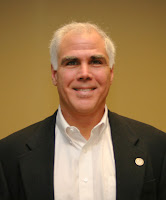
Angela McFarline - Online Communities of Learning
(http://www.bris.ac.uk/education/people/academicStaff/edaemf)
"There has been a chorus of pronouncements that "the information society" both requires and makes possible new forms of education" - Seymour Papert and Guy Caperton, 1999.
Angela began her thought-provoking presentation with her astute observation that we lack a bold vision of what education could be as a result of technology utilization by students. She sais that while we have a tendency to engage in "techno-romanticism," we have to keep our feet firmly on the ground.
"We've had 20 years of a future which was a disappointment" - John Gardner. If we're not careful, we're going to have another disappointing 20 years.
Part of the problem is that there are many people who still think that knowledge is deliverable. However, there are a growing number of us, like Angela, who think that knowledge is constructible.
Direct Impact Model (DIM):
Traditionally defined curriculum and learning culture + Traditionally defined ICT skills, leads to activity using new technology and ICT skills, which leads to improved knowledge and understanding and improved attainment.
However, there is not enough substantive use of the technology.
Socially contextualized Impact Model (SCIM): self-directed learning runs parallel to Institutional learning with some overlap - Traditionally defined ICT skills and Home-based task.
A lot of kids are doing great things in school, but an awful lot of what they are doing is banal and trivial. How many are really have enriching and productive experiences of digital media in online communities?
The kids that not are getting this don't have the community in which to have those enriching experiences. They lack the social capital in the form of a highly educated home, and parents who are highly involved. in their educational lives.
Meaningful learning disrupts:
*Teacher roles
*Learning behaviors
*Ideas about learning
*Models of knowledge
In the first one-to-one program in Queensland, Australia, the experts came in to show the kids Logo, then left and let the kids do the programming on their own while the teachers had no idea what was going on and were not able to help their kids - which the kids clearly understood.
Media/Tools + Content + Pedagogical Model wrapped around a Meaningful Task.
Looking at the patterns of usage of computers in the UK align with the US: almost all kids have access to a computer outside of school before the age of 12. As a result, They Power Down once the get into their classrooms.
Angela use the Promethean Activote 2.4 system to get responses to the following question:
"The link between ICT use and learning remains elusive because technology use:
A. Does not support traditional learning
B. Testing does not capture relevant learning
C. There is insufficient use of ICT
D. Use of ICT is not well managed for learning
E. Too much software is not well designed
F. There is insufficient digital content
Here are the results:
A. 8.9%
B. 21.7%
C. 6.9%
D. 54.2%
E. 2.0%
Angela then let the audience choose the direction of the presentation by posing three things to discuss:
A. Handheld technology
B. Online creative communities
C. Managing face to face interactions
Here are the results:
A. 14.8%
B. 52.2%
C. 26.6%
We overwhelming chose Online Creative Communities.
New Wuxia Novels are typically over 10,000 words, written in chapters over a period, have a large following and have constructive and positive comments (http://www.wuxiasociety.org/).
In these communities there is a lot of one-to-one tutoring going on. The key things about blogs is that they are a good place for people to come together and exchange ideas.
Plant (2004:54) defines an online community as "a collective group of entities, individuals or organizations that come together either temporarily or permanently through an electronic medium to interact in a common problem or interest space."
However, in schools, we often penalize student for collaborating since we consider it some form of "cheating." So until we encourage students to work together and stop penalizing student interaction, we shouldn't be enthusiastic about what might happen.
Have we lost sight of education as a process of personal enrichment? If we have, then we are
We don't educate kids anymore, we train them. That's why they can decode text, but they can't read.
We need to elicit among our students the ability to ask good questions. Many of the effective online communities are full of good questions of these types:
Problem solving "How can I take a photograph like this one?
Requests for information "What do you think of the new CAD system? Does it really help?"
Seeking experience "Can we visit your personal photography lab?"
There is a whole lot of interaction going on using a host of technologies. The online community stuff that's visible is only a part of what's going on. It's the visible part that the public can see, but there is much going on beyond what we can see.
Amazing social project: BioEthics Education Project, or BEEP (http://www.beep.ac.uk/content/index.php).
Unfortunately kids still lack skills in information filtering and quality assessment; don't question the authority of information sources, have a diminished vocabulary compared to the past, and don't like to think. They are too overloaded with information to care. They cut and paste without engaging because they are too busy preparing for exams. They just don't want to know the stuff that's not on the exam. And these are some of the brightest and best students.
This is what we have to pay attention to because we over test.
We are turning out generations of people who can take tests, but who can't learn. And the only difference between the rich kids and the poor kids is that we give the rich kids certificates for not being able to learn.

No comments:
Post a Comment